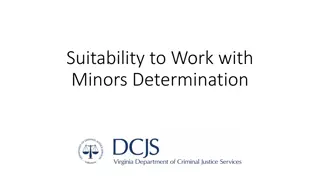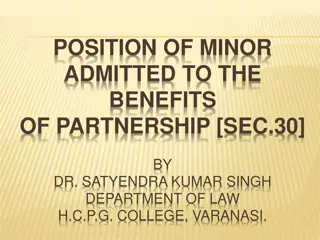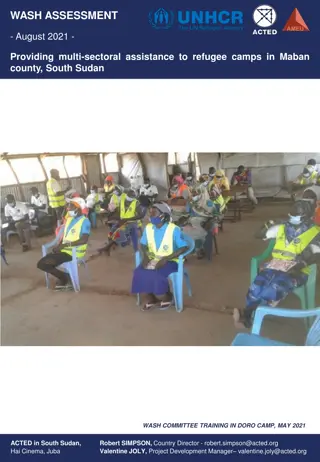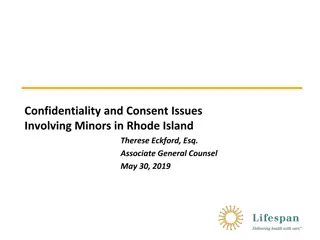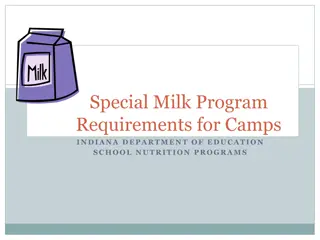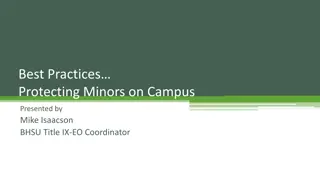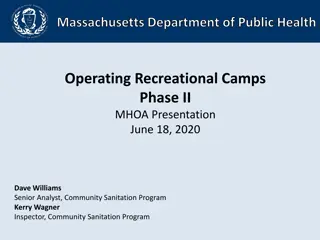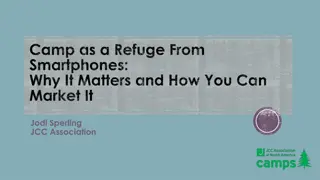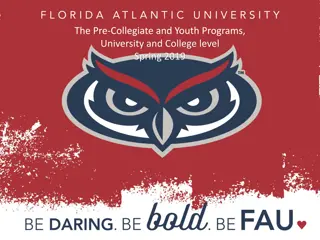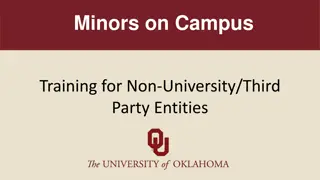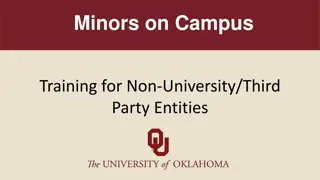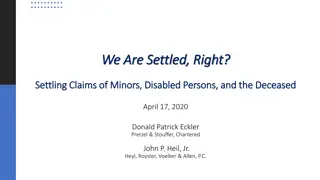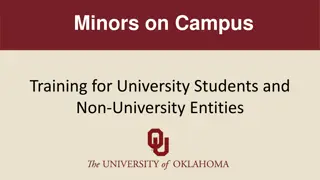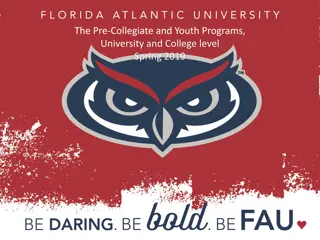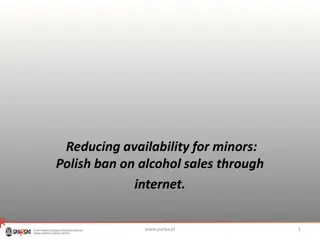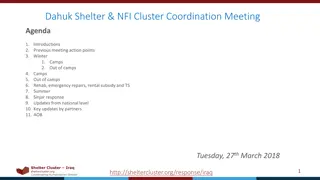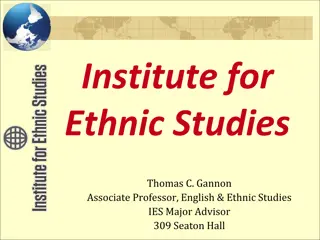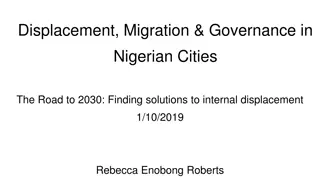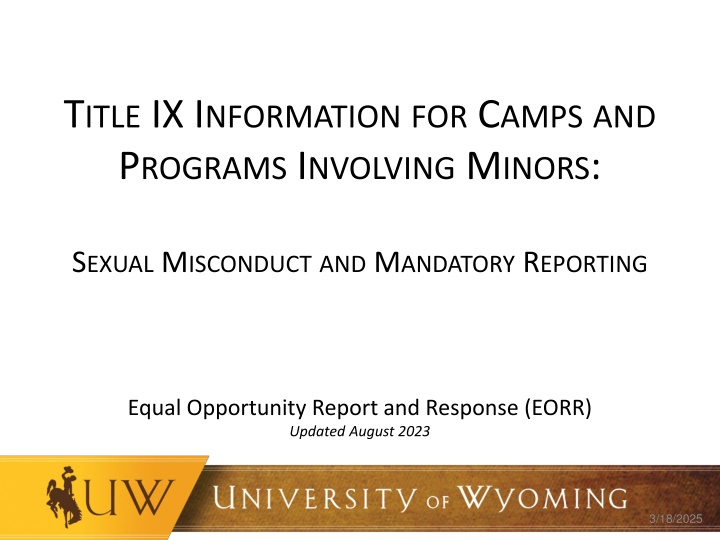
Title IX and Sexual Misconduct in Camps and Programs
Explore the basics of Title IX compliance and reporting processes in camps and programs involving minors. Learn about sexual misconduct, discrimination, and mandatory reporting to create a safer community environment. Contact the Equal Opportunity Report and Response (EORR) office for further details and resources.
Download Presentation

Please find below an Image/Link to download the presentation.
The content on the website is provided AS IS for your information and personal use only. It may not be sold, licensed, or shared on other websites without obtaining consent from the author. If you encounter any issues during the download, it is possible that the publisher has removed the file from their server.
You are allowed to download the files provided on this website for personal or commercial use, subject to the condition that they are used lawfully. All files are the property of their respective owners.
The content on the website is provided AS IS for your information and personal use only. It may not be sold, licensed, or shared on other websites without obtaining consent from the author.
E N D
Presentation Transcript
TITLE IX INFORMATION FOR CAMPS AND PROGRAMS INVOLVING MINORS: SEXUAL MISCONDUCT AND MANDATORY REPORTING Equal Opportunity Report and Response (EORR) Updated August 2023 3/18/2025
Purpose To educate viewers on the basic aspects of Title IX and civil rights compliance, and the reporting process. To help make the campus community safer and those within the community aware of their duties and reporting options. This is only an overview of important information for questions or additional resources, contact the EORR office. 3/18/2025
UW policy The University does not discriminate on the basis of race, gender, religion, color, national origin, disability, age, protected veteran status, sexual orientation, gender identity, genetic information, creed, ancestry, political belief, or any other applicable protected class or participation in any protected activity. Sexual misconduct and discrimination are expressly prohibited and will not be tolerated. The policy applies when conduct occurs: On University property, or Off University property, if in connection with a University- recognized program or activity.
What is sexual misconduct? Sexual misconduct incorporates a range of behaviors including but not limited to: Domestic and dating violence Sexual harassment Sexual assault Sexual exploitation Stalking Hostile environment sexual harassment Any other conduct of a sexual nature that is unwelcome or nonconsensual. For a list of definitions, see UW s Equal Opportunity, Harassment, and Nondiscrimination Policy
What is prohibited? Discrimination - when an individual suffers an adverse consequence on the basis of a Protected Class (race, religion, gender, etc.) Harassment Verbal or physical conduct that unreasonably interferes with an individual's work or academic performance or creates an intimidating or hostile work or educational environment. Retaliation - intimidating, threatening, coercing, harassing, or discriminating against any individual because they made a report or participated in any manner in a review of harassment or discrimination.
Types of Discrimination The University does not discriminate on the basis of race, gender, religion, color, national origin, disability, age, protected veteran status, sexual orientation, gender identity, genetic information, creed, ancestry, political belief, or any other applicable protected class or participation in any protected activity. The University will not tolerate acts of discrimination or harassment based upon Protected Classes or related retaliation against or by any employee or student. Individuals who violate this Regulation shall be subject to corrective action and/or discipline, up to and including termination or separation from the University.
Mandatory Reporting All UW employees are considered mandatory reporters, except: University Counseling Center (and other mental health counselors) Student Health Services (and other medical staff) Student Legal Services Ombudsperson Must share all known details, names, etc. Camps and programs involving minors are expected to report all incidents of sexual misconduct or discrimination to EORR (UW s Title IX office), and all incidents and accidents involving a minor must be reported to both the UW Risk Management and UW Safety Offices.
CONFIDENTIALITY Only those persons necessary for the investigation and resolution of the complaint will be given any information. The University will respect the confidentiality of the complainant and the individual against whom the complaint is filed to the extent possible, consistent with the University s legal obligations to protect the rights and security of its employees and students.
What happens when you report? Establish safety Is there immediate danger that requires law enforcement? Does anyone need emergency medical assistance? Steps necessary to make people safe? (Temporary housing, no-contact orders, schedule changes, returning home, etc.) Refer to resources Support (counseling, advocates to explain/guide through process, etc.) Medical care (physical injuries, preventing pregnancy or transmittable infections) Academic (coordinating with instructors, logistics) Discuss reporting options
Reporting Options Timeline Sooner is better it s more difficult to investigate/remedy as time goes on. Through UW You don t have to participate in process/hearings/etc. but have the right. You don t have to participate to access resources. Law enforcement Not required to make a report (unless minors are involved), but are encouraged to do so. Anonymous reporting options are available. Advocates can help/support them through this process. Biological evidence collection 72 hour maximum, but sooner is better.
Confidential Reports A report of sexual misconduct to the following individuals while they are acting within their professional capacity may be considered confidential by law: Advocates: SAFE Project Counselors: University s Counseling Center, Trauma Clinic, or other clinics Health care providers: Student Health Services Other mental health counselors, medical professionals, victim advocates, or clergy members A report to these individuals will NOT be shared with other entities or employees, unless the reporting party gives consent. NOTE: This confidentiality does not apply if there is concern for the immediate health and safety of any individual or when a minor is involved in an incident of abuse.
When Minors are Involved According to Wyoming statutes 14-3-205 & 35-20-103, everyone must report suspected abuse, neglect or exploitation of child or vulnerable adult if they have reasonable cause to believe that it may be occurring. Child or adult abuse, neglect or exploitation has no boundaries according to sexual orientation, ethnic background, age, religion, disability, or gender. To make a report of an at-risk minor, contact UWPD (uwpd@uwyo.edu, 766-5179)
POLICY PROHIBITING RETALIATION The University affirms the right of individuals to make a report without fear of reprisal. Each employee or student, who, in good faith, makes a report of discrimination or sexual misconduct of any kind, is protected from retaliation. Reports of retaliation shall be treated as separate and distinct from original reports and will be investigated by EORR. Employees or students engaging in such retaliation may be subject to appropriate disciplinary action up to and including separation from UW. Similarly, persons who file frivolous or bad faith allegations shall be subject to disciplinary action.
Maintaining Healthy Boundaries UW recommends that camp/program staff: Carefully review the requirements of UW s Minors on Campus policy; Set appropriate physical and emotional boundaries with students to make sure you both feel safe and comfortable; Communicate these boundaries before there is a conflict; Model professionalism in your face-to-face and virtual interactions with students; and Make sure any and all physical contact with students is consensual and does not violate UW policies against sexual misconduct. Remember, you should not have one-on-one contact with minors!
Professional Distance Get to know your students, but maintain professional distance: Don t get to know them TOO personally. You don t need to know about their love relationships, drinking habits, or personal problems. They don t need to know these details about your life either! Do not accept follow/friend requests from students on social media. Do not exchange personal email/phone information without parental permission. This is especially important with minors!
For more info: www.uwyo.edu/reportit Policies and procedures Lists of resources Contact information Useful information Ways to learn more
MANDATORY NOTICE The University of Wyoming does not discriminate in its education programs and activities. To make a report, contact Equal Opportunity Report and Response: Jim Osborn Manager of Investigations Bureau of Mines Room 320 jim.osborn@uwyo.edu, 766-5228 TITLE IX COORDINATOR EORR Main Office Bureau of Mines Room 318 report-it@uwyo.edu, 766-5200 Reports can also be made on our website: www.uwyo.edu/reportit

